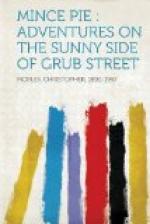We suppose there is hardly a man who has not an apple orchard tucked away in his heart somewhere. There must be some deep reason for the old suspicion that the Garden of Eden was an apple orchard. Why is it that a man can sleep and smoke better under an apple tree than in any other kind of shade? Sir Isaac Newton was a wise man, and he chose an apple tree to sit beneath. (We have often wondered, by the way, how it is that no one has ever named an apple the Woolsthorpe after Newton’s home in Lincolnshire, where the famous apple incident occurred.)
An apple orchard, if it is to fill the heart of man to the full with affectionate satisfaction, should straggle down a hillside toward a lake and a white road where the sun shines hotly. Some of its branches should trail over an old, lichened and weather-stained stone wall, dropping their fruit into the highway for thirsty pedestrians. There should be a little path running athwart it, down toward the lake and the old flat-bottomed boat, whose bilge is scattered with the black and shriveled remains of angleworms used for bait. In warm August afternoons the sweet savor of ripening drifts warmly on the air, and there rises the drowsy hum of wasps exploring the windfalls that are already rotting on the grass. There you may lie watching the sky through the chinks of the leaves, and imagining the cool, golden tang of this autumn’s cider vats.
You see what it is to have Caliphs in the world.
AS TO RUMORS
MADRID, Jan. 17.—Nikolai Lenine was among the Russians who landed at Barcelona recently, according to newspapers here.—News item.
It is rather important to understand the technique of rumors. The wise man does not scoff at them, for while they are often absurd, they are rarely baseless. People do not go about inventing rumors, except for purposes of hoax; and even a practical joke is never (to parody the proverb) hoax et praeterea nihil. There is always a reason for wanting to perpetrate the hoax, or a reason for believing it will be believed.
Rumors are a kind of exhalation or intellectual perfume thrown off by the news of the day. Some events are more aromatic than others; they can be detected by the trained pointer long before they happen. When things are going on that have a strong vibration—what foreign correspondents love to call a “repercussion”—they cause a good deal of mind-quaking. An event getting ready to happen is one of the most interesting things to watch. By a sort of mental radiation it fills men’s minds with surmises and conjectures. Curiously enough, due perhaps to the innate perversity of man, most of the rumors suggest the exact opposite of what is going to happen. Yet a rumor, while it may be wholly misleading as to fact, is always a proof that something is going to happen. For instance, last summer when the news was full of repeated reports of Hindenburg’s death, any sane man could foresee that what these reports really meant was not necessarily Hindenburg’s death at all, but Germany’s approaching military collapse. Some German prisoners had probably said “Hindenburg ist kaput,” meaning “Hindenburg is done for,” i.e., “The great offensive has failed.” This was taken to mean that he was literally dead.




